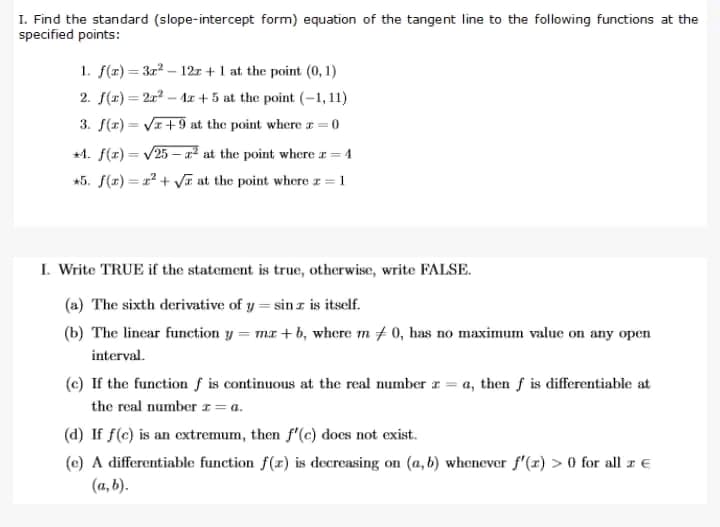I. Find the standard (slope-intercept form) equation of the tangent line to the following functions at the specified points: 1. f(x)=3x²-12x+1 at the point (0,1) 2. f(x)=2x² - 4x +5 at the point (-1,11) 3. f(x)=√x+9 at the point where a=0 +1. f(x)=√25-² at the point where a 4 *5. f(x)=x² + √ at the point where z = 1
I. Find the standard (slope-intercept form) equation of the tangent line to the following functions at the specified points: 1. f(x)=3x²-12x+1 at the point (0,1) 2. f(x)=2x² - 4x +5 at the point (-1,11) 3. f(x)=√x+9 at the point where a=0 +1. f(x)=√25-² at the point where a 4 *5. f(x)=x² + √ at the point where z = 1
Algebra & Trigonometry with Analytic Geometry
13th Edition
ISBN:9781133382119
Author:Swokowski
Publisher:Swokowski
Chapter7: Analytic Trigonometry
Section7.6: The Inverse Trigonometric Functions
Problem 91E
Related questions
Question

Transcribed Image Text:I. Find the standard (slope-intercept form) equation of the tangent line to the following functions at the
specified points:
1. f(x)=3x² - 12z+1 at the point (0,1)
2. f(x)=2x² - 4x +5 at the point (-1,11)
3. f(x)=√x+9 at the point where z=0
+4. f(x)=√25-² at the point where a = 4
*5. f(x)=²+√ at the point where z = 1
I. Write TRUE if the statement is true, otherwise, write FALSE.
(a) The sixth derivative of y=sin z is itself.
(b) The linear function y = mz+b, where m / 0, has no maximum value on any open
interval.
(e) If the function f is continuous at the real number z = a, then f is differentiable at
the real number z = a.
(d) If f(c) is an extremum, then f'(c) does not exist.
(e) A differentiable function f(x) is decreasing on (a, b) whenever f'(x) > 0 for all z €
(a, b).
Expert Solution
This question has been solved!
Explore an expertly crafted, step-by-step solution for a thorough understanding of key concepts.
Step by step
Solved in 4 steps with 8 images

Recommended textbooks for you

Algebra & Trigonometry with Analytic Geometry
Algebra
ISBN:
9781133382119
Author:
Swokowski
Publisher:
Cengage

Algebra and Trigonometry (MindTap Course List)
Algebra
ISBN:
9781305071742
Author:
James Stewart, Lothar Redlin, Saleem Watson
Publisher:
Cengage Learning

Trigonometry (MindTap Course List)
Trigonometry
ISBN:
9781337278461
Author:
Ron Larson
Publisher:
Cengage Learning

Algebra & Trigonometry with Analytic Geometry
Algebra
ISBN:
9781133382119
Author:
Swokowski
Publisher:
Cengage

Algebra and Trigonometry (MindTap Course List)
Algebra
ISBN:
9781305071742
Author:
James Stewart, Lothar Redlin, Saleem Watson
Publisher:
Cengage Learning

Trigonometry (MindTap Course List)
Trigonometry
ISBN:
9781337278461
Author:
Ron Larson
Publisher:
Cengage Learning